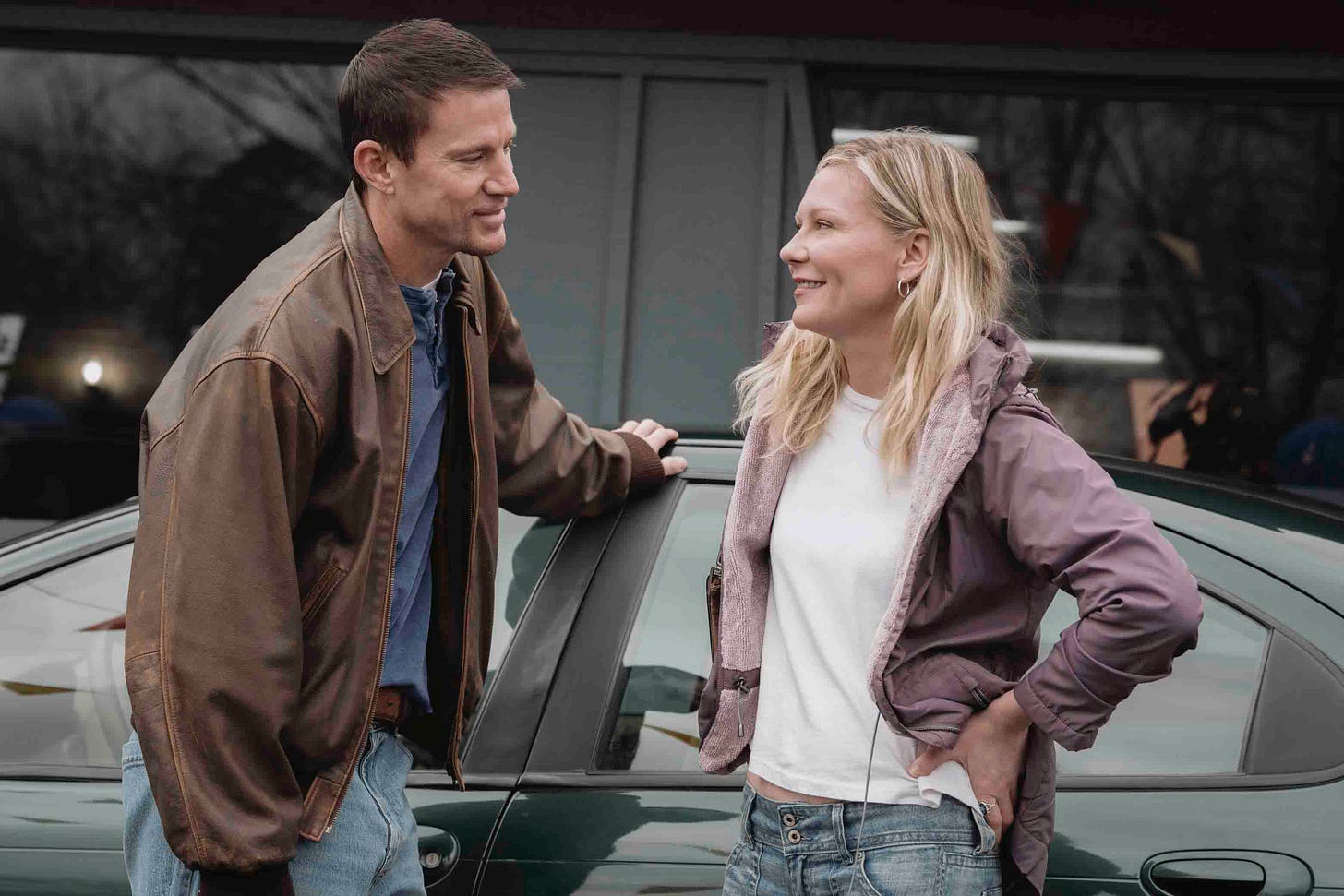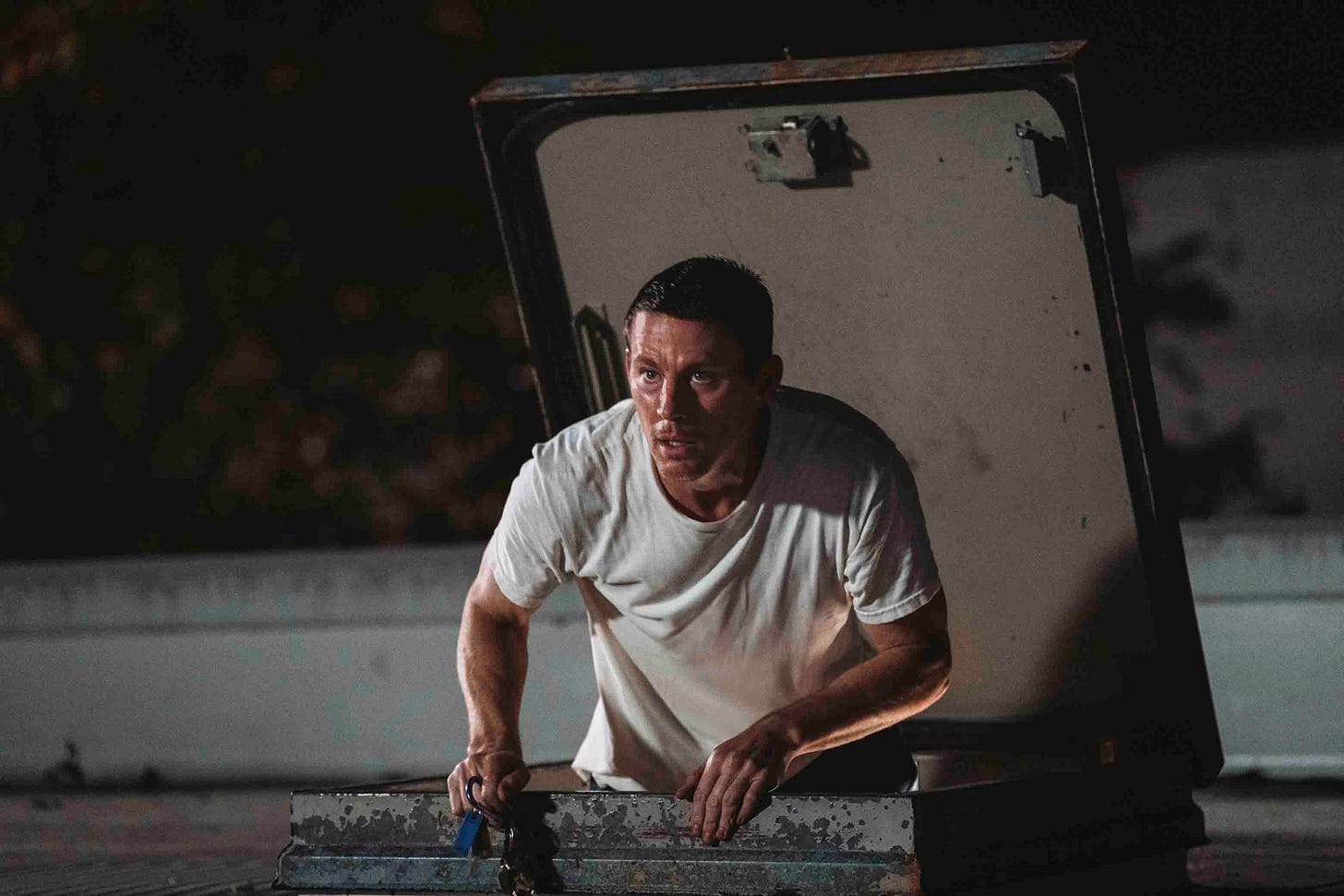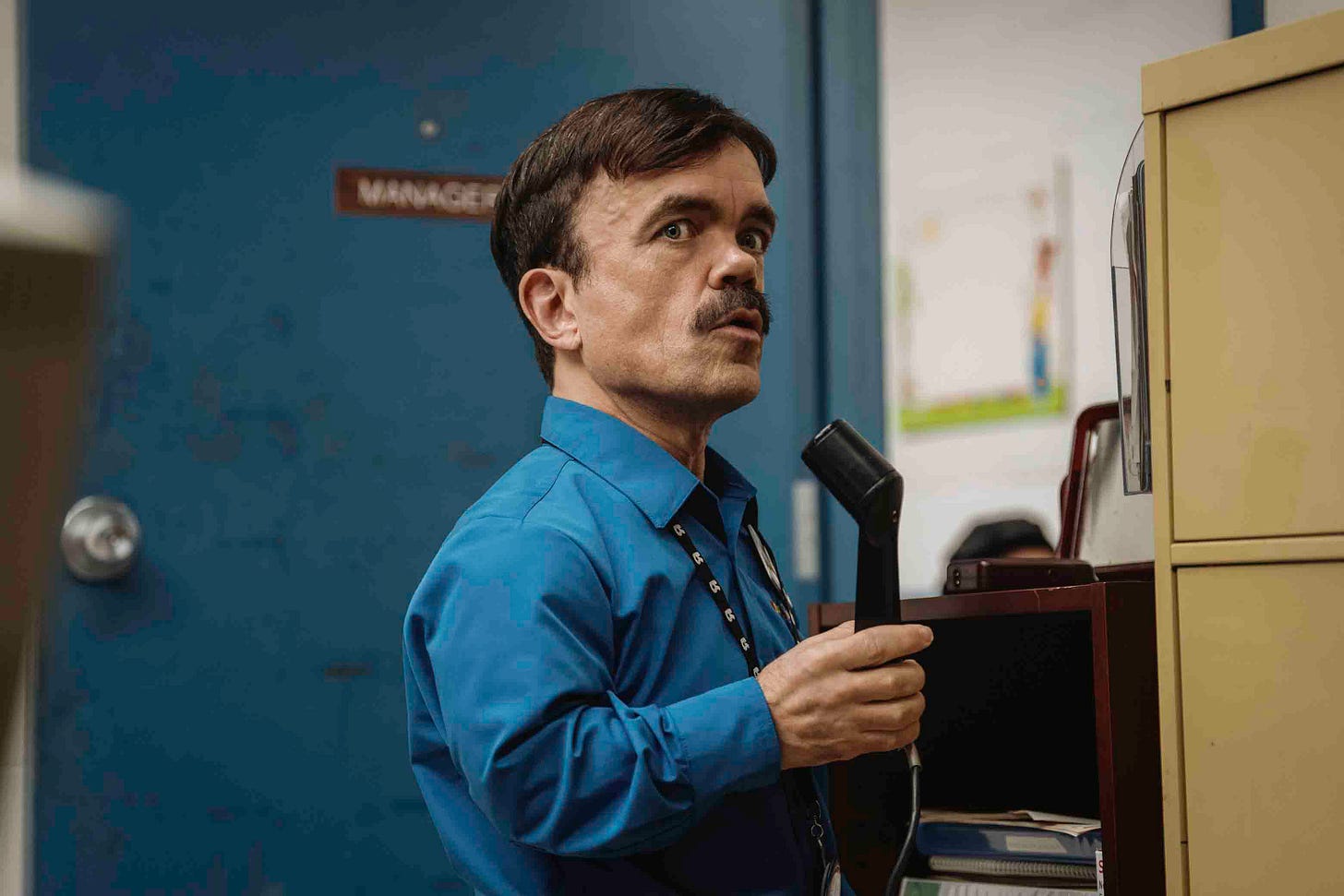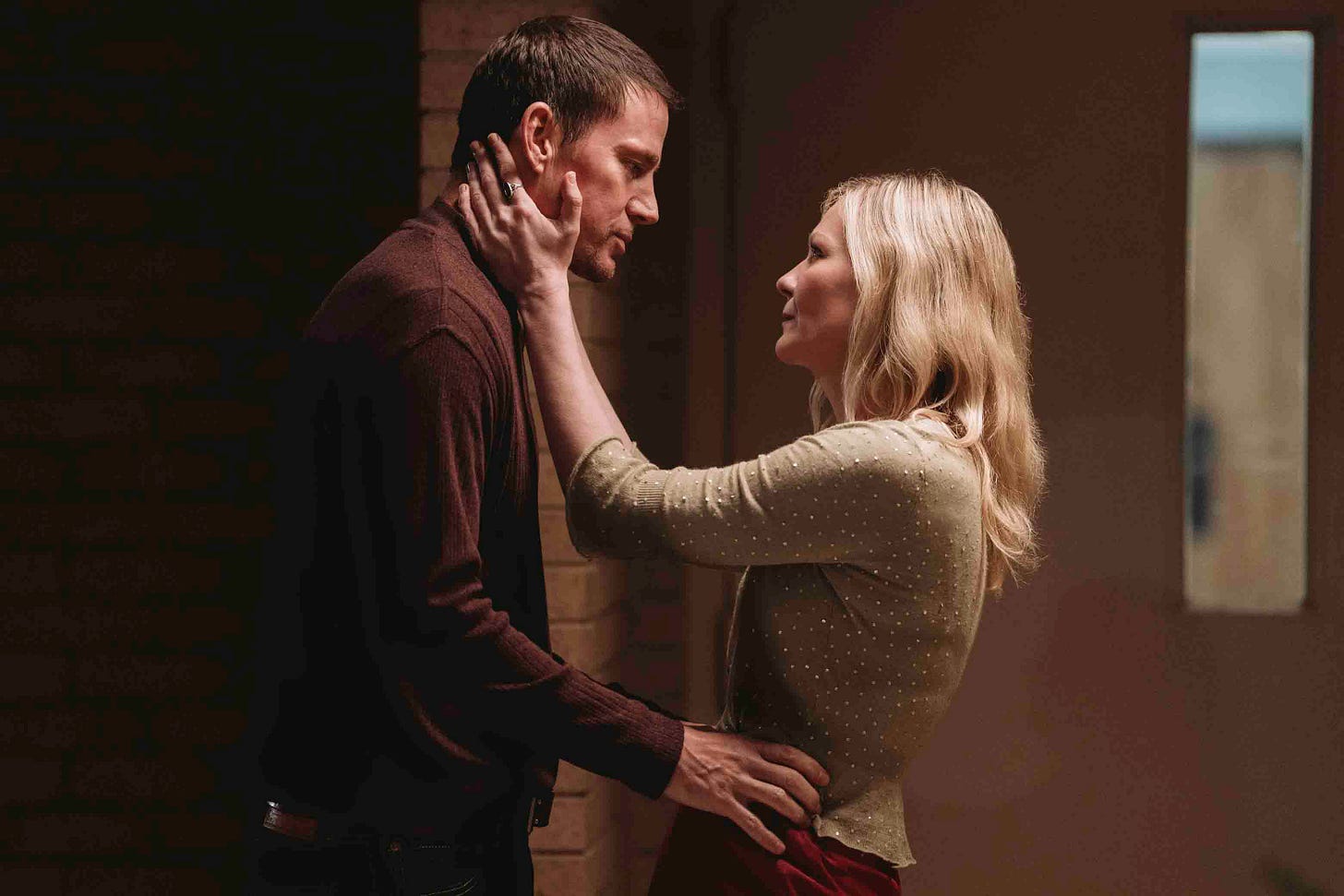Review: “Roofman” is affecting until it exchanges empathy for platitudes
When the 'moral of the story' feels like gaslighting
Headline aside, this isn’t really a review of Roofman. To ‘review’ a film implies, at least in part, whether one ‘recommends’ the work in question, and why. I’m not really concerned with that question here. Roofman is, to be clear, an eminently watchable and for the most part deeply engaging film, one filled with many fine performances from a laundry list of great actors, including career-best work from Channing Tatum in a turn almost overflowing with brittle, bruised humanity. It is an easy film to recommend in nearly every way, but those qualities are not what I am interested in writing about.
I want to write about Roofman because it made me profoundly sad. If I am ‘reviewing’ anything here, it is that sadness – an interrogation which involves and implicates the film, but along lines that are more perpendicular than parallel to the typical task of a movie review.
I think director Derek Cianfrance knows and intended that Roofman would instill such sadness, to at least a certain degree. Much has been made of this being an unexpectedly “sweet” tonal shift for the director of Blue Valentine andThe Place Beyond the Pines, but it’s a sweetness that feels barbed. There is a breezy quality to the film, a low-key quirkiness apropos of the ‘true story’ details the film is based on, but it never feels like a comedy or a caper to me. The very real undercurrents of humanity and levity at work here ultimately function to underline the sadness of what we’re watching: they make us aware of how contingent those small moments of happiness are, in the real world of brutal capitalistic pressures and inhuman carceral terror the film’s characters (and, indeed, its viewers) inhabit. Derek Cianfrance didn’t suddenly pivot from moody Ryan Gosling movies to a made-for-TV ‘stranger than fiction’ caper; he knows, I have to believe, that he’s making a film about how people can be decent and skillful in all sorts of ways, only to be turned, through the systems of class, capital, and incarceration, into ‘criminals’ whose rights and humanity can be stripped clean. The film is shot through with that tragic awareness.
Roofman tells the apparently ‘true story’ of Jeffrey Manchester, a former Army Reserve member who robbed a string of McDonalds, went to prison, escaped from prison, and spent months hiding out inside a Toys ‘R Us until he was recaptured after another robbery. I don’t know how ‘true’ this story is as presented in the film, and for the purposes of this piece, I don’t much care; what I’m interested in is the story the film tells, and how it tells it, whether or not it’s ripped from the headlines. And that story is one of a person trained by US armed forces, who re-enters society only to find the American economy has no place for the skills he was taught; he is told, like all American men are, that he needs to be a provider for his family, and that ‘providing’ is necessarily concomitant with material goods; those conflicting pressures collide in illegal actions, for which he is sentenced to a wholly unconscionable – and all too routine – 45 years in prison. His family is instructed that the best way to deal with this is to cut all ties with him. He escapes, using those same skills of observation and ingenuity that landed him in state custody in the first place, and sets about trying to find human connection again.
The sadness of it all really hit me in a scene where Tatum’s character tries to win over the children of his new girlfriend, Leigh (Kirsten Dunst, as reliably great as she always is), throwing himself into the project of connecting with kids with an infectious glee. This is probably one of the scenes other critics are thinking of when they tell us Roofman is unexpectedly sweet; I could only see it as tragic. Tatum’s Jeffrey has been branded a criminal, and is technically on the run; he is not allowed to have this joy. This kind of domestic bliss and simple human connection is now off limits. Joy is contingent in our society: you can have it, theoretically, but only if you stay in line. And even if you do stick to the social script, like Leigh – a divorced mother barely making ends’ meet with a Toys ‘R Us job – that happiness is, in fact, more theoretical than actionable, thanks to the brutal hours she works. Could Jeffrey even have this little moment of faux-parental ‘sweetness’ were he not on the run? In the lone scene we see of his pre-criminal life – a birthday party for his daughter that leaves everyone disappointed – he’s just as miserable as Leigh. Maybe it’s true that ‘crime doesn’t pay,’ but for most of us in the working class, neither does a life spent on the straight and narrow.
I know not every viewer will feel this kind of ambivalence. Some will be persuaded by the moralizing, patriarchal tone that sets in near the end, about how this story was not a tragedy of society and systems, but of one man making bad choices on a purely individual level. Prison is his natural ‘home,’ we’re told in the final scenes when he inevitably returns there, and it is where he deserves to be, irreparably, for what might be the rest of his natural life. We all carry different ideological priors into the movie theater: mine is that I fundamentally reject this worldview. I believe prison is a profound evil, as is the mentality that people are beyond worldly redemption; and I think that individual choices and personal responsibility, while important, pale utterly in comparison to the societal, structural forces that shape the context in which individual choices are made. The American carceral state especially exists mainly as a tool of state repression and capitalist exploitation; it’s slavery with a different name, and our entire legal and economic system is constructed to fill the buildings with as many bodies as possible.
For much of its runtime, Roofman struck me as a very poignant expression of this tragic cycle: of what it is to be dehumanized by the law; of what beauty there is in rediscovering that humanity through community; and of how brutally, incomprehensibly sad it is that our society is structured to so thoroughly disallow that kind of redemption. The tension animating the entire film rests on the audience’s awareness that there is absolutely nothing Jeffrey could do to earn back the rights that were stripped from him in a courtroom. There is no way he could make amends or show contrition for his crimes short of spending decades in a box toiling away for the state. Once a criminal, always a criminal. There are shades of Les Misérables in here, with Channing Tatum playing a 21st-century Jean Valjean, whose youthful theft of a loaf of bread meant the state would only ever accept his submission and subjugation – never his redemption.
Again, I think Derek Cianfrance knows this, at least in part. The last shot of the film proper – a tear from Dunst’s eye turning black as it runs through her mascara while she visits Tatum in prison – is gloomily poetic, expressing a wider systemic grief through visuals alone. But that image is also fighting against an insidious moralizing tone that creeps in around the edges of the film’s final act, a tone that is then pushed into overdrive through a closing text scroll and a montage of documentary footage running over the end credits. The moral the film lands on – put directly in Tatum’s mouth, in a sort of ‘here’s what we learned today’ after-school special sort of way – is that Jeffrey’s family never needed things, they only needed him; having mistaken ‘materialism’ for ‘connection,’ he will now spend the rest of his life in prison, where those connections will be functionally impossible. He’ll never get to learn from his mistakes and try again, but maybe you can learn the lesson instead.
But that’s bullshit, isn’t it? Not just within the bounds of my own personal morality and view of the world, which left me feeling sick just typing that last paragraph. No: this is an insidious misdirection even if one takes everything on the film’s own terms. As I noted earlier, the one scene we see of Jeffrey pre-crime spree is of his family being deeply disappointed in his inability to ‘provide.’ Having grown up in the same context Jeffrey and his family did, we know exactly what ‘provide’ is coded to mean in this context: how materially comfortable can you, as The Man, make your wife and children? We all know what is expected of us, such that the film can code Jeffrey’s motivations in shorthand. And this is only underlined, with further clarity, when we meet Leigh at the Toys ‘R Us Jeffrey hides out at. Her awful boss (the decidedly non-awful Peter Dinklage) tells her to prioritize The Company over family; it’s the profits of the faceless corporation that come first, and if there’s time left over, maybe you can spend it with your kids. Leigh is only able to share a few hours of Christmas Day with her children because Jeffrey, while illegally hiding out in the Toys ‘R Us office, illicitly changes the schedule in the computer. Leigh’s daughter suggests, at one point, that Leigh quit her job. It is, again, a moment of narrative shorthand, because we in the audience know why that’s impossible: Leigh’s family cannot actually sustain themselves on her presence and love alone. Jeffrey’s family couldn’t either. If she didn’t work, the state would punish her too, one way or another.
The film makes a point of highlighting Dinklage’s character’s unwillingness to donate toys to Leigh’s church’s holiday toy drive, even if it’s returned merchandise they aren’t allowed to sell. Jeffrey overhears this, then takes those discarded toys and hands them over to Leigh’s church. In the context the film presents, that sure feels like a Robin Hood scenario to me: ‘stealing’ from the rich (if reappropriating tossed aside inventory somehow counts as theft) to give to the poor. Why, then, does the end credits montage prominently feature an interviewer expressing horror at the idea of donating ‘stolen’ toys? What does ‘stealing’ even mean, on a moral spectrum, in this context?
I keep coming back to that word – context – because it is everything. The context of society, the context of the narrative, the context in which that wholly hypocritical moralizing comes at the film’s end. And of course, there is the context in which this film enters the world: a context where, to put it bluntly, I find it impossible to give a single solitary fuck about someone knocking over a fast-food chain. We live today amidst thieves raiding our government and brutalizing our countrymen on a level no individual serving prison time anywhere in America could even begin to fathom. We are staring down the barrel of a total fascistic collapse of the American experiment; steal all the McDonald’s you want, for all I care. The greatest villains at work in our country will never face a fraction of the punishment we reserve for poor people who rifle through a cash register in a moment of desperation. Bob Dylan, the greatest living wielder of the English language, never sang truer words than these: “Steal a little and they throw you in jail; steal a lot and they make you King.”
By the end of Roofman, I felt sick to my stomach, in a way I haven’t felt in a movie theater for quite some time. Here was a film that engendered so much sympathy for its main subject, that worked so hard, with such finely observed nuance and many real moments of grace, to get us invested in this man’s humanity. And here it was, wrapping itself up by putting him back in jail, by separating him once again from all the things that allowed him to feel and express that humanity – and rather than reckon with how unfathomably sad that ending is, here we see Tatum himself monologuing to justify this as a ‘fair’ and ‘reasonable’ resolution. Then comes the ‘true story’ documentary footage, running roughshod over all the film’s nuances, an ideological Zamboni smoothing things over into a tidy ‘true crime’ package. It’s sad this guy made these choices, yes, but that’s ALL that’s sad about it. Move along. Gee, isn’t it weird how a ‘criminal’ could be such a nice guy? That’s not supposed to happen. Good thing he’s been removed from society. Go home and sleep soundly; this curio has been stored safely away.
I wish we lived in a country that allowed people to be more than their worst moments. I wish this mostly good film allowed itself to linger on that existential discomfort at the end, instead of flattening everything into an easily digestible moral of personal responsibility. If I felt such discomfort as a viewer, watching the film contort itself to make comforting moral sense of this story within the bounds of the sociopolitical status quo, I have to wonder if Cianfrance, Tatum, or anyone else involved in the production feels similarly uneasy about the finished product. Filmmaking is fundamentally an exercise in empathy; it is an exercise Roofman largely excels at, until it comes time to paper things over with platitudes.
Read the book 200 Reviews by Jonathan R. Lack in Paperback or on Kindle
Subscribe to PURELY ACADEMIC, our monthly variety podcast about movies, video games, TV, and more
Like anime? Listen to the podcast I host with Sean Chapman, JAPANIMATION STATION, where we review all sorts of anime every week. Watch on YouTube or Subscribe wherever you get your podcasts.







Just finished watching the film, and you nailed every single emotional and intellectual reaction I’m having to a tee. I am amazed and appreciative that someone else sees the broader socio-political and economic context as I do. I hope there are thousands of us! Millions!
Thank you for expressing it all so clearly. I’d love to hear the director’s reaction if someone were to get your article in front of him. The actors too. Hint Hint, Kevin McCarthy, or other journalists!